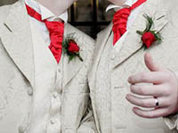St. Petersburg vs. gays: Scandal of global scale
Until recently, Moscow authorities were the prime enemy of the Russian gay community. The Moscow government has earned such a reputation for the decisions to ban gay pride parades in the Russian capital. On Sunday, the authorities of St. Petersburg picked up the slack. The governor of Russia's cultural capital, Georgy Poltavchenko, signed the document that prohibited the propaganda of homosexual and pedophilic activities in the city.

In accordance with the law, the public actions that propagandize homosexuality, bisexuality and transgenderness among underage individuals entail administrative fines of up to 5,000 rubles ($200) for common citizens and 50,000 rubles ($2,000) for officials. The fine for legal entities is much larger - from 250 to 500 thousand rubles ($8-16 thousand).
Nikolai Alekseev, Russia's prominent advocate of gay rights, filed an anti-defamation lawsuit against Vitaly Milonov, a deputy of the Legislative Assembly of St. Petersburg. Mr. Milonov is the author of the new bill.
Alekseev is suing Milonov over several formulations in the document. In addition, the gay activist was offended with Vitaly Milonov calling him "a woman." "For all of his years, I don't know how old he is, they don't usually ask women's age..." Milonov once said about Alekseev.
Nikolai Alekseev evaluated his honor and dignity at one million rubles. ($35,000). The gay activist is determined to take revenge on the official to have him involved in the struggle for the rights of gays and lesbians in Russia.
"The deputy will have to take part in the activities, which he is trying to ban with the help of his bill. He has shot himself in the foot. Maybe he will fall under his own bill about the propaganda of homosexuality," BaltInfo quoted Alekseev.
In addition, Alekseev said that the law should be overturned because of its formulations. According to Alekseev, the law bans the propaganda of homosexuality, but says nothing about heterosexuality. There are clear vestiges of discrimination in that, and it will be very easy to prove that at the European Court for Human Rights, he stated.
Moreover, Russian LGBT activists announced their intention to hold individual educational pickets in St. Petersburg. The events will be arranged near schools and children's libraries. It appears that sexual minorities intend to annoy intolerant deputies.
The homosexual controversy in Russia's St. Petersburg has reached the United States - the country that is always involved with everything.
A statement from the US State Department, which was released before the St. Petersburg governor signed the above-mentioned document, said that the United States was concerned about the Russian bill which could seriously restrict the rights for self-expression and meetings of homo, bi, transgender individuals and practically all Russians in general. US Secretary of State Hillary Clinton said that it goes about human rights, whilst human rights imply gay rights.
However, the majority of Russians do not share the concerns of US officials. The majority of Russian bloggers support the St. Petersburg bill.
Sociologists say that tolerance (particularly to homosexual individuals) as a social phenomenon has been fading in Russia during the recent decade. The majority of respondents said in 2010 that they refused to take homosexual practice for normal relationships. Seventy-four percent of the polled said that gays and lesbians were morally perverted and mentally unbalanced individuals (68% - in 1998). Only 15 percent of Russians believe that homosexual and heterosexual individuals should enjoy equal rights in the Russian society. The research was conducted by Levada Center.
"Superficial Orthodoxy plays an important role at this point. The Church works as a mechanism to relieve people of responsibility, particularly moral responsibility. Everyone knows what attitude the Church shares to homosexuals," Natalia Zorkaya, a senior expert with Levada Center said.
No matter what could be the basis for the Russian intolerance to sexual minorities, the LGBT community has to deal with them. Neither the European Court for Human Rights, nor the US State Department will be able to show any influence on a Russian parent, who comes to pick their child from school and sees a gay activist conducting an "educational picket" on the porch.
Ksenia Obraztsova
Pravda.Ru
Subscribe to Pravda.Ru Telegram channel, Facebook, RSS!





